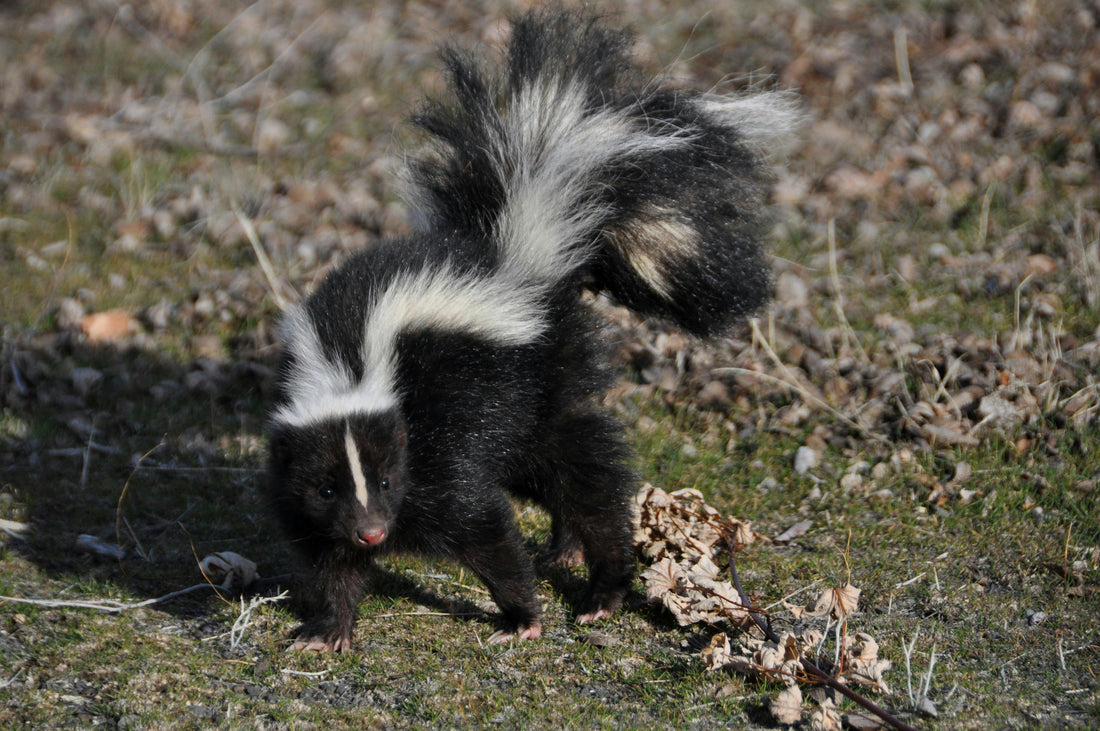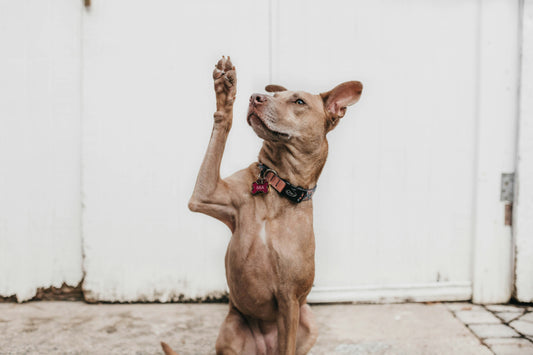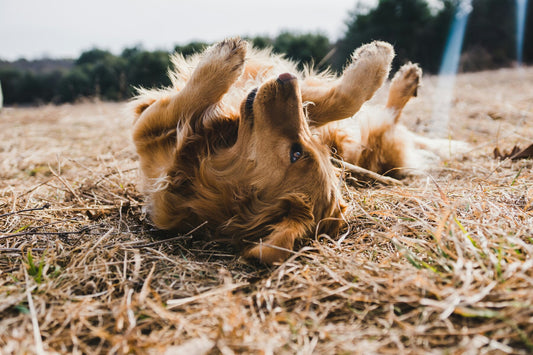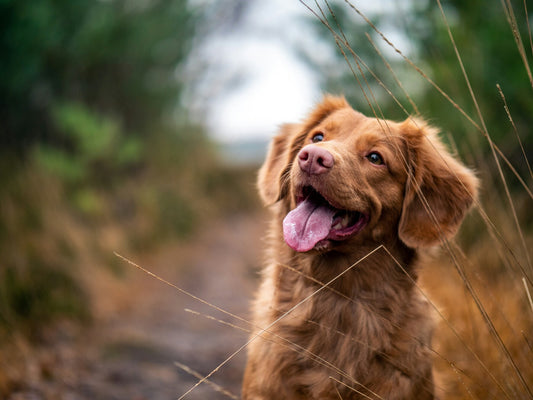The Ultimate Guide to Dealing with a Dog Sprayed by a Skunk

Finding out your dog has just been sprayed by a skunk is a hard realization. That unmistakable whiff of “skunk odor” all over your dog’s fur might very well be your worst nightmare.
Thankfully, this article will arm you with everything you need to know to deal with this unpleasant situation and avoid it happening again. Stick with us, and you’ll discover effective solutions, from immediate responses to preventive measures, ensuring you’re always prepared.
Why Do Skunks Spray Dogs?
Skunks are often misunderstood. Their signature spray isn’t out of malice but is a potent natural defense mechanism. When threatened or cornered, skunks release this foul-smelling secretion from their anal glands as a deterrent.
For dogs, their natural curiosity and sometimes their protective instincts can put them right in the firing line. Your playful pup might see a skunk as a playmate, but the skunk sees a potential threat. Understanding this behavior is the first step in ensuring it doesn’t become a recurring episode in your dog’s adventurous life.
Immediate Steps When Your Dog Gets Sprayed
When you realize your dog has been sprayed by a skunk, it’s vital to act promptly. Every second counts and your response can make all the difference in how this smelly situation unfolds.
First and foremost, resist the urge to let your dog inside, no matter how much they plead with those puppy eyes. Bringing a skunk-sprayed dog indoors will only spread the stench throughout your home. Instead, secure them in a safe outdoor area, away from other pets and potential skunk hiding spots.
Next, do a quick check. A skunk’s spray isn’t just smelly – it can be irritating, especially if it comes into contact with your dog’s eyes, mouth, or face. If you notice any redness, excessive drooling, or if your dog seems to be in distress, it’s crucial to rinse the affected areas with cool water immediately.
While these steps won’t eliminate the odor, they’ll ensure your dog’s safety and minimizing the aftermath of the skunk encounter. Remember, your prompt action is the first line of defense against the lingering effects of skunk spray.
Homemade Solution to Deal With Skunk Sprays
With the right ingredients from your kitchen, you can concoct effective remedies to neutralize the odor. One of the most recommended DIY solutions combines hydrogen peroxide solution, baking soda, and liquid dish soap. This mixture breaks down the oily residue of the skunk spray, neutralizing its pungent odor.
To whip up this remedy, you’ll need:
- 1 quart of 3% hydrogen peroxide
- ¼ cup of baking soda
- 1-2 teaspoons of liquid dish soap
Combine the ingredients in a bucket, making sure to wear gloves. Before applying, check your dog’s skin for any cuts or wounds, as the solution can sting. Gently scrub the solution onto the affected areas of your dog’s fur, avoiding the eyes, ears, and mouth. Let it sit for about 5 minutes and then rinse thoroughly with water.
While this solution is known for its effectiveness, it’s essential to use it immediately after mixing, as storing it in a closed container can be dangerous. If your furry friend’s misadventure has left a particularly potent stench, you might have to repeat the process.
Does Tomato Juice Work?
Another tip? Tomato juice is a popular remedy that some swear by. However, while it might mask the odor temporarily, it doesn’t neutralize it. So, while your dog might smell slightly better, they’ll also be tinted pink!
Remember, DIY remedies are a great first step, but for some persistent odors, store-bought solutions or professional grooming might be necessary.
Over-the-Counter Solutions
After trying out DIY remedies, you might find that some stubborn odors linger. Don’t despair; there’s an array of over-the-counter products specifically designed to combat the challenge of skunk odors. These store-bought solutions often contain specialized enzymes that work wonders in breaking down and neutralizing skunk oils.
Among the top-rated are de-skunking shampoos. When selecting one, ensure you’re choosing a product that doesn’t just mask the smell but eradicates it. Read reviews, ask for recommendations, or consult with your vet to find the most effective products on the market.
Apart from getting rid of the immediate stink, consider your dog’s overall well-being. After such an unpleasant encounter, your pet’s skin and coat might need a little extra care. Quality supplements can play a pivotal role in this recovery. Omega-3 fatty acids, for instance, can boost skin health and restore the luster to your dog’s coat.
While over-the-counter solutions and supplements can be lifesavers in these smelly situations, always ensure that any product you use is safe for your pet. Carefully read the instructions and watch out for any adverse reactions.
Dealing with Lingering Odors in Your Home
A skunk-sprayed dog can quickly transfer that pungent odor to every nook and cranny of your home, especially if they’ve spent time indoors after the encounter. Addressing the smell in your home requires a comprehensive approach.
First, tackle fabrics that might have come into contact with your dog. Wash affected clothing, bedding, or curtains using a mix of your regular detergent and baking soda. For carpets or upholstery, consider using a steam cleaner or specialized cleaning products designed to handle organic odors.
Ventilation plays a crucial role. Open your windows and let fresh air circulate through your home. If the scent proves stubborn, you might want to invest in an air purifier or employ odor-neutralizing products. These often contain natural enzymes that break down the smell at its source.
Lastly, remember that repetition might be necessary. Depending on the severity of the skunk spray and the materials affected, you may need to clean and air out spaces multiple times. Patience and persistence are key to completely eliminating that persistent skunk smell from your living space.
Tips to Prevent Future Skunk Encounters
Skunk encounters are always a surprise, but they don’t have to be a recurring one. Prevention is the best remedy, and with a few precautionary steps, you can ensure that your dog doesn’t face off with these striped critters again.
Awareness is the starting point. Familiarize yourself with skunk habitats. Skunks tend to be nocturnal and often reside in burrows, wooded areas, or even under structures like decks or sheds. By understanding where skunks live, you can be cautious during dusk and dawn walks, or when letting your dog out during these times.
Training plays a pivotal role. While curiosity is part of a dog’s nature, teaching them solid recall commands and ‘leave it’ cues can be lifesavers in potential skunk confrontations. Always supervise outdoor play in the early evenings or mornings, particularly in areas known for skunks.
Lastly, consider deterrents for your property. Motion-activated lights or sprinklers can dissuade skunks from setting up residence in your yard. If you’ve spotted a skunk, avoid leaving out food or trash that might attract them.
Signs It’s Time to Visit the Vet
Skunk spray is notorious for its odor, but it’s not just the smell that dog owners should be concerned about. Sometimes, skunk encounters can have medical implications that require professional attention.
One immediate concern is if your dog gets sprayed directly in the eyes. A direct hit can lead to temporary blindness and significant discomfort. If your dog is squinting, pawing at their face, or exhibiting signs of eye irritation, it’s crucial to flush their eyes with cool water immediately. Persistent redness, swelling, or discharge should warrant a trip to the vet.
The potency of skunk spray can sometimes lead to nausea or vomiting if your dog tries to clean themselves and ingests the spray. Pay attention to any signs of lethargy, drooling, or loss of appetite in the days following the incident.
Additionally, while rare, some dogs can exhibit allergic reactions to skunk spray. Watch out for any unusual swelling, especially around the face or neck, difficulty breathing, or any other sudden behavioral changes.
Conclusion
Skunk encounters, while unpleasant, are a common problem for many dog owners. Equipped with the right knowledge and tools, you can effectively neutralize that pungent odor and ensure your pet’s safety and comfort. From understanding why skunks spray to mastering DIY remedies and recognizing when professional help is needed, you now have a comprehensive guide at your disposal.
Bando is dedicated to providing top-quality care products and supplements to cater to all your pet’s needs. If you’re seeking solutions to boost your pet’s overall skin health or to counteract the aftermath of such encounters, look no further. We invite you to browse our catalog and encourage you to reach out to our team for assistance on what supplements or care products to choose for your pet. Here’s to many more joyful, skunk-free adventures with your furry friend!






